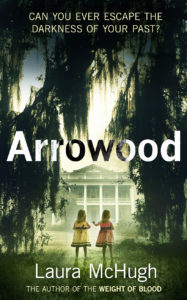Books
Dear Reader: a letter from Laura McHugh
Dear Reader,
In Des Moines, Iowa, in 1982, twelve-year-old Johnny Gosch set out alone to deliver newspapers for the Des Moines Register in the early-morning darkness. Sometime before dawn, two blocks from home, he disappeared, his wagon abandoned on the sidewalk. There were few clues; an eyewitness claimed that he had seen the boy talking to an unidentified man, but the tip didn’t lead to any answers. Searches were fruitless. Two years later, a second Des Moines Register paperboy, Eugene Martin, would vanish from his route. The cases went cold, and to this day remain unsolved.
At the time of Johnny Gosch’s disappearance, my family lived a few hours away, in the southeastern tip of the state, along the banks of the Mississippi River. My older brothers and sisters delivered newspapers—one of the few paying jobs you could get before the age of sixteen—and occasionally they would take me along to help. Our town was small and safe, filled with lovely hundred-year-old homes and surrounded by cornfields, and we weren’t afraid to be out on our own in the dark, walking the empty streets near the river. We felt invincible, as children often do. Until the kidnapping in Des Moines, I hadn’t truly understood that such terrible things could happen to anyone, anywhere; that a child in Iowa could disappear within sight of his home.
 The missing boys were on my mind as I wrote my second novel, which is set in the nostalgic landscape of my childhood along the river. Arrowood centers around the unsolved disappearance of twin girls, Violet and Tabitha Arrowood, from the front yard of their home on a bluff overlooking the Mississippi. The twins’ older sister, Arden, witnesses their kidnapping, but just as in the Des Moines case (and so many others), the information Arden provides to the police is not enough to find the children or lead to an arrest. Eyewitness accounts are notoriously unreliable, and in the worst instances, they jeopardize an investigation by moving it in the wrong direction—as Arden discovers when she is confronted with evidence that there is something not quite right about what she saw the day her sisters disappeared.
The missing boys were on my mind as I wrote my second novel, which is set in the nostalgic landscape of my childhood along the river. Arrowood centers around the unsolved disappearance of twin girls, Violet and Tabitha Arrowood, from the front yard of their home on a bluff overlooking the Mississippi. The twins’ older sister, Arden, witnesses their kidnapping, but just as in the Des Moines case (and so many others), the information Arden provides to the police is not enough to find the children or lead to an arrest. Eyewitness accounts are notoriously unreliable, and in the worst instances, they jeopardize an investigation by moving it in the wrong direction—as Arden discovers when she is confronted with evidence that there is something not quite right about what she saw the day her sisters disappeared.
I set the story in a place that is close to my heart: the historic river town where I spent summers with my grandparents. Keokuk is known for its lock and dam, where we would watch barges move up and down the river, and for its beautiful nineteenth-century mansions, no two alike. In recent years, Keokuk has fallen into disrepair, shrinking and decaying like so many small towns in that part of the country. The factories that employed much of the town have closed, Main Street is blighted with boarded-up storefronts, and many of the handsome old homes have begun to rot and collapse. Bank-owned mansions sit empty, even at bargain prices, because few people can afford the necessary repairs or the exorbitant heating bills for a drafty, oversized home. My grandparents’ small cottage is among the casualties, abandoned and overgrown.
The houses of Keokuk, both the stately and the ruined, served as inspiration for the houses in the novel, though one house in particular inspired the Arrowood family’s namesake mansion. Twenty years ago, my sister moved back to Keokuk and bought the Alois and Annie Weber House, which is on the National Register of Historic Places. It’s a three-story Second Empire beauty with a creepy stone-and-dirt basement, an ancient skylight, and an elaborate wraparound porch that always seems to be in the process of being scraped and repainted. One day, my sister’s husband discovered a concealed panel in the floor of a downstairs room. He removed the panel and shone a light down into a primitive underground room that was completely separate and inaccessible from the rest of the basement. That hidden room opened up a world of possibilities in my mind: it could have been used to hide runaway slaves on the Underground Railroad, or to stash liquor during Prohibition, or for something far more mundane—or more sinister. There was no way of knowing. I loved the idea of a house keeping secrets. I knew that Arrowood would have secrets of its own, ones that it wouldn’t easily give up.
Years after witnessing the kidnapping of her sisters, Arden will have to dig deep into the ruins of her family and her dying hometown if she wants to find the truth about what happened that terrible day. It’s not unusual for families involved in cold cases to hold out hope for resolution decades after their loved ones were taken from them, and sometimes even the most unlikely cases are eventually cracked. A man was recently arrested for the murder of two missing sisters from Maryland, Sheila and Katherine Lyon, forty years after they disappeared from a shopping mall near their home.
I still think of the missing boys from Des Moines, Johnny and Eugene, and the families who are waiting for them to return. The truth is there, somewhere, waiting for someone to unearth it.
Laura McHugh


Please note: Moderation is enabled and may delay your comment being posted. There is no need to resubmit your comment. By posting a comment you are agreeing to the website Terms of Use.